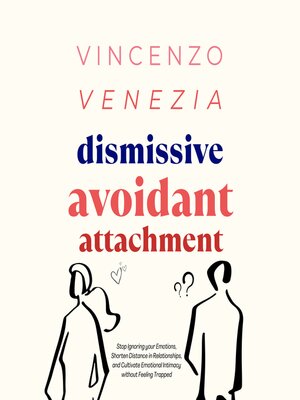Dismissive Avoidant Attachment
audiobook (Unabridged) ∣ Stop Ignoring your Emotions, Shorten Distance in Relationships and Cultivate Emotional Intimacy without Feeling Trapped
By Vincenzo Venezia

Sign up to save your library
With an OverDrive account, you can save your favorite libraries for at-a-glance information about availability. Find out more about OverDrive accounts.
Find this title in Libby, the library reading app by OverDrive.



Search for a digital library with this title
Title found at these libraries:
| Loading... |
Do you find it difficult to maintain a successful relationship and enter into intimacy?
Despite your noble efforts to advance your romantic relationship, is it not moving forward?
Are you afraid of feeling vulnerable or trapped in a relationship?
Avoidant-dismissive attachment is a behaviour pattern that involves a high level of avoidance in intimacy and a low level of abandonment anxiety. When intimacy increases, people express avoidant patterns and adopt distancing tactics out of discomfort.
They do not rely on others and do not want others to rely on them, keep their innermost thoughts to themselves and have difficulty asking for help.
I recommend reading this manual if you have experienced in your romantic relationship and in your relationship with yourself:
- A strong sense of self.
- Independence as a person, content to take care of yourself and do not feel you need others.
- You see vulnerability as a weakness.
- Discomfort with your emotions; your partner often accuses you of being too closed, distant, intolerant and rigid.
- Use of sarcastic tones by yourself that always end up hurting and putting distance between friends, co-workers and your own partner.
- The suppression of emotional experiences.
- A tendency to minimise or ignore your partner's feelings, keep them secret, engage in other relationships and even end the relationship in order to regain your sense of freedom.
- Poor tolerance for conflict.
Fortunately, there are methods in this manual to identify and interrupt dysfunctional patterns and cultivate new ones that are helpful and tailored to you. It is important to do this for yourself, your loved ones, and ultimately your children.
Take action now
Turn the "switch" of your emotions back on once and for all. It may be challenging but it is worth it.






